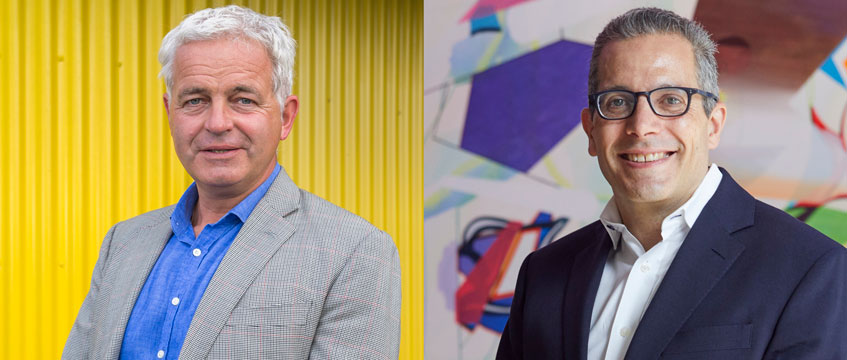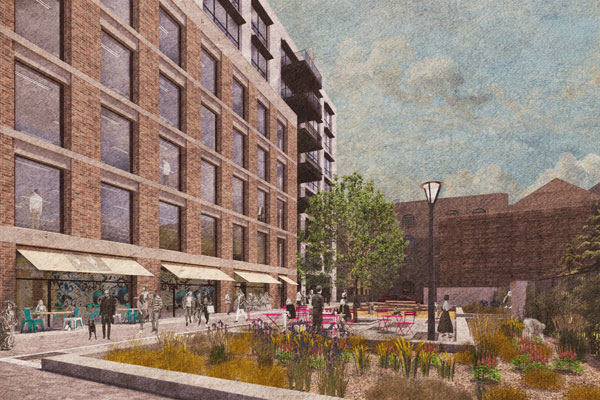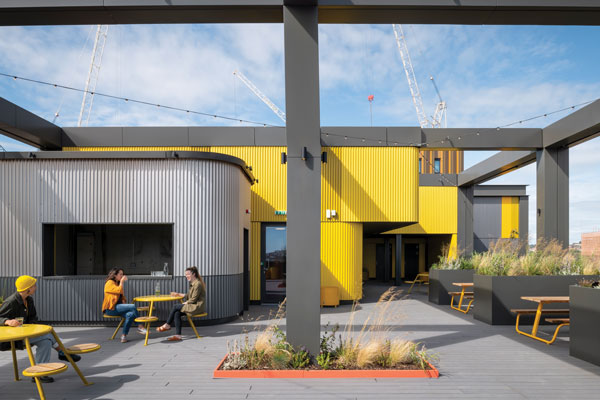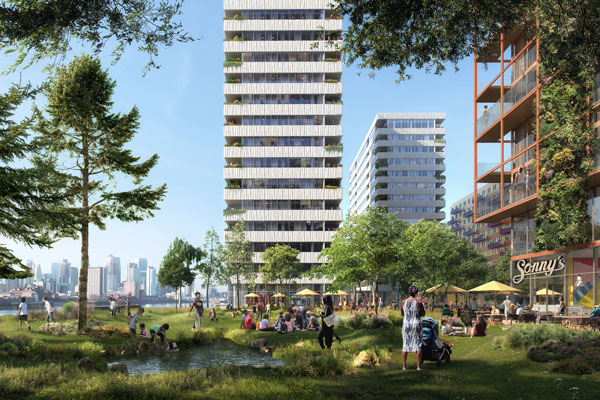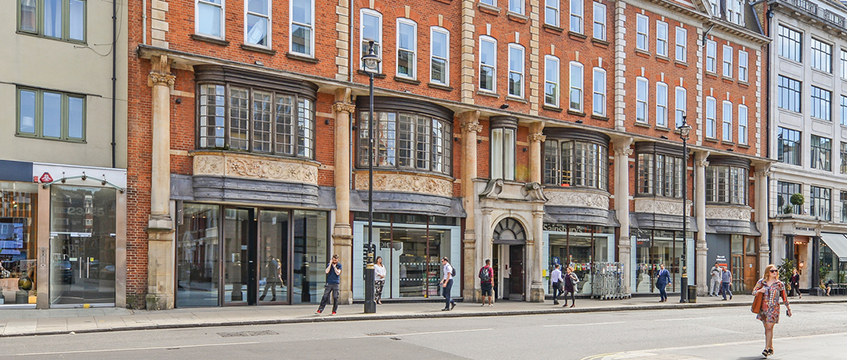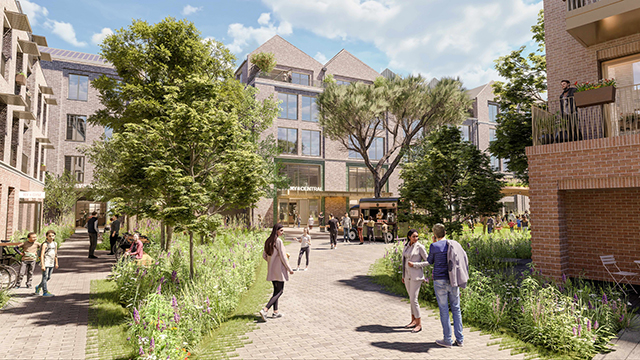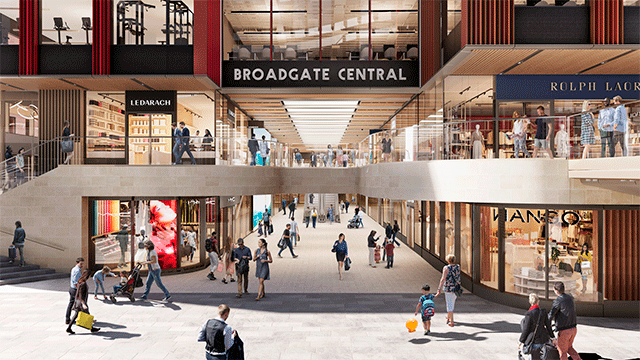The recent past has not been kind to regeneration developer and investor U+I. The company fell into the red during the year to 31 March. Its shares are trading at their lowest levels since the early 1990s. And Britain has now officially sunk into its deepest recession on record.
But this is not the first recession that chief executive Matthew Weiner or chief development officer Richard Upton has endured.
“We have the fortune, or misfortune, to have driven out two recessions before,” says Upton. As founder of Cathedral Group, which U+I bought in 2014, he similarly dealt with a large GDV and a small capital base during the great financial crisis. “The value that we created was actually driving out of the recession,” he says today.
Now, the duo is “seeing positives where there are complexities”. Subcontract prices are coming off by around 10%, Upton says.
“It’s a very good time, if you have the capital, to be building and delivering compared to maybe four or five years ago,” he adds. “There are difficulties in some places, but there are some opportunities if you’ve got the right product and the right capital to be improving the model at this point.”
Milestones to monetisation
After taking action to reduce costs, Weiner says the developer is hitting its stride again. The company has cut development capex by £33m, drawn £13.5m against uncharged assets and trimmed staff numbers.
“We’ve reached a point of stability – in the context of the global pandemic, but it’s still stability – and now it’s about moving forward,” says Weiner. “We’ve focused capex where it’s best focused within the business, and it’s time to move on and deliver on the projects.”
That capex is largely channelled towards more liquid, higher margin projects with “clear milestones to monetisation”.
A few plans have either been pulled or suffered setbacks – housing secretary Robert Jenrick has called in U+I’s £500m GDV redevelopment at 8 Albert Embankment, SE1, and the developer has withdrawn from its joint venture with Barnet Council to redevelop North Finchley High Street.
But in the past six months planning has been secured on four sites: the £1.5bn Mayfield project in Manchester; its £330m scheme with Brockton Capital at Kensington Church Street, W1; its £240m Landmark Court plans in Southwark; and the £250m Newtown Works regeneration in Ashford.
“With the benefit of those planning consents in place, we’re very confident we’ve got the family silver to work,” says Upton.
The company is on the hunt for funding partners for these projects, starting with the first phase of Mayfield.
“There’s strong interest for capital post-Covid – enough to give us competitive tension, to be confident that each of those are going to move to site through the course of this financial year,” says Upton.
Proposals for six more schemes with a combined GDV of about £1.8bn have been submitted, including two PPP projects – the 1.7m sq ft Morden Wharf scheme on the Greenwich Peninsula, and the five-acre Faraday Works site next to the Thames.
There is also capacity for another sizeable PPP project. “The government wants us to bid for mixed-use projects… but we will get Mayfield to site first and get that settled during the course of the year,” says Upton.
Going for the green
The company is seeking opportunistic land acquisitions, mainly in London, the South East, Manchester and Dublin. It is teeing up a portfolio of golf courses and other brownfield, green belt land as relatively low-cost, high opportunity assets. So far it has amassed around 515 acres, with scope for more than 2,500 homes. “Golf courses are clearly failing, before Covid and definitely during Covid,” Upton says.
The homes on this land will be built into a new platform offering garden communities to millennial consumers seeking to move out of more urban environments. U+I is targeting some £80m of gains from these over the next eight years.
Such locations play into the duo’s wider vision of how the nature of real estate, in terms of homes and places to work, will change post-Covid and in light of the ongoing climate crisis.
Although there is still a place for traditional offices in that vision, it involves a different type of home that incorporates its own working environment, sitting within sustainable and inclusive communities.
Upton cites inspiration from Ebenezer Howard, founder of the garden city movement, for U+I’s design work on the residential aspects of the platform.
He quotes an extract of Howard’s works, dating back to 1902: “There are in reality not only… two alternatives – town life and country life – but a third alternative, in which all the advantages of the most energetic and active town life, with all the beauty and delight of the country, may be secured in perfect combination.”
“That’s 118 years ago – we learned slow,” adds Upton.
X marks the spot
Additionally, the developer is placing its bets on its Plus X “innovation hub” concept, the first of which launched last month within its Preston Barracks development in Brighton. It owns a 50% stake in the operator. Kitted out with prototyping studios, a fab lab, auditorium space and green electricity, among many other features, the seven-story Plus X building seems to have the ingredients for a dynamic work space.
But leasing has been a struggle during the Covid-19 crisis. Upton says one Holland-based multinational was on the cusp of signing for space before the pandemic, for an R&D cohort – but although interest is “still there”, talks are on hold.
Upton admits Plus X Brighton is the biggest void in U+I’s portfolio, but he is confident that the 53,000 sq ft hub will be “substantially let” by the end of the year.
The project’s approach towards sustainability and wellness should drive interest, he hopes – this has long defined U+I’s approach to “futureproofing” its schemes. Commissioned research from economic consultant Real Worth has found that the innovation hub model provides 160 times the socio-economic benefit of a standard office per sq ft, and 16 times that of a mainstream co-working space.
At some point the City and others will start to value the social dividend… as well as the financial benefit, and you won’t be considered some wild hippy for doing it
– Richard Upton
To further illustrate its impact, the company is collecting data from the Plus X hub to quantify its inclusivity and wellbeing levels, such as staff numbers trained in first aid and mental health, and incidences of sick leave.
Demonstrating the use of such findings is essential to keeping any regeneration from sounding “like fancy words from somebody looking to ‘socio-economic wash’ a scheme”, says Upton.
As part of its sustainability strategy, launching in its 2021 financial year, the company will introduce a system of metrics to measure socio-economic value across its portfolio.
“The more we map that empirically and get better [at it], and perhaps get more consistent as an industry, the more the value of the development and regeneration industries will show themselves to society,” Upton says.
Not just ‘some wild hippy’
Weiner notes the industry appears to have finally reached the understanding that quality and profit are self-reinforcing, in terms of unlocking both financial and social potential at a property.
The challenge lies in how quickly this is recognised in wider financial metrics, although the growing diversity in financial wealth is a positive sign.
“I feel the next transfer of wealth through the generations will be the trigger point,” he says, adding: “If I showed my kids Gordon Gekko in Wall Street saying that ‘greed is good’, they’d laugh and think it was a comedy. They’d think you can’t seriously have somebody stood up there saying that metric, in the world we now live in.”
Until the metrics shift further, the pair will continue in their efforts to convince the City of the merits of social value.
“There are some that are fixated on the spreadsheet and two decimal places, and there are others who aren’t,” says Weiner. “It’s our job to go find the [global] capital that understands the message.”
Upton adds: “At some point the City and others will start to value the social dividend, or the whole benefit of their investment, as well as the financial benefit, and you won’t be considered some wild hippy for doing it – it will be considered a sustainable, defensible business that has its part in society. There will be shareholder value from that. Until then, we’ll have to confound the cynics.”
To send feedback, e-mail pui-guan.man@egi.co.uk or tweet @PuiGuanM or @estatesgazette







